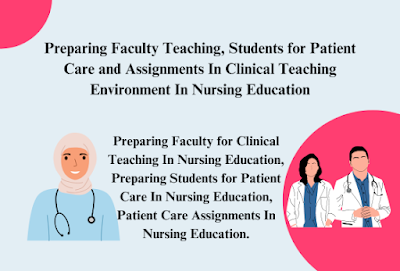The Preparing Faculty Teaching Students for Patient Care and Assignments In Clinical Teaching Environment In Nursing Education. Faculty should focus on creating a positive learning environment, providing constructive feedback, and utilizing a variety of clinical teaching methods to enhance student learning and competency.
The Preparing Faculty Teaching Students for Patient Care and Assignments In Clinical Teaching Environment In Nursing Education
Preparing faculty for effective patient care and clinical roles in nursing education encompasses several key areas, including understanding students’ learning needs, implementing effective teaching methods, and addressing potential challenges.
Students for Patient Care and Assignments In nursing education, effective clinical teaching is essential to prepare future nurses for real-world patient care. Both faculty and students need specific preparation to thrive in the clinical learning environment. This article explores strategies for preparing faculty for clinical teaching, equipping students for patient care, and effectively assigning patient care responsibilities to ensure optimal learning outcomes.
Preparing Faculty for Clinical Teaching in Nursing Education
The development and preparation of faculty for clinical teaching is crucial but often under-discussed. Many faculty members lack exposure to evidence-based teaching strategies, leading to gaps in their instructional capabilities. According to Dahlke et al. (2012) and McNelis et al. (2014), clinical educators often receive minimal formal training in learning theories and instructional methods.
To address this, programs like the Clinical Faculty Development Program have been introduced to provide faculty with opportunities to practice teaching through simulations and reflective exercises. This program, designed by Krautscheid, Kaakinen, and Warner (2008), uses clinical teaching scenarios to enhance faculty’s ability to reflect on their teaching practices and create a safe learning environment for students.
However, it can be challenging to develop teaching skills in expert clinicians who maintain full-time clinical roles. Many may have experience as preceptors, but transitioning to a full-fledged clinical teaching role requires additional instruction and mentoring. Schools and institutions are increasingly implementing development modules and online orientation courses to guide clinicians through this transition. Programs like the Clinical Nurse Educator Academy, developed by Cangelosi, Crocker, and Sorrell (2009), aim to foster enthusiasm among clinicians for teaching while highlighting the need for ongoing mentorship to support their role as educators.
An effective clinical teacher must possess a blend of clinical competence, instructional skills, and the ability to guide students toward developing clinical reasoning and judgment. Faculty also need to build strong interpersonal skills to foster long-lasting relationships with students and colleagues. Institutions should continue to invest in the training and ongoing development of clinical faculty to maintain high educational standards.
Preparing Students for Patient Care in Nursing Education
Preparing nursing students for patient care requires a well-structured approach that integrates theoretical knowledge with hands-on experience. Faculty must select teaching strategies based on educational goals, learning principles, and student needs. Commonly used methods in clinical teaching include patient care assignments, clinical conferences, nursing rounds, and written assignments.
A critical aspect of preparing students for clinical practice is educating them on the importance of patient confidentiality, as mandated by the Health Insurance Portability and Accountability Act (HIPAA). Faculty must ensure that students fully understand the HIPAA regulations and apply them in all patient interactions. This includes safeguarding patient information and adhering to privacy protocols in every aspect of care. Proper education on HIPAA helps instill ethical practices in students from the outset.
Patient Care Assignments in Nursing Education
Patient care assignments are a cornerstone of nursing education, offering students the opportunity to apply learned concepts in real-life scenarios. These assignments require students to integrate, synthesize, and use previously acquired knowledge and skills in patient care.
The process of making clinical assignments varies and may involve the clinical teacher, students, healthcare staff, or a collaborative approach between them. Allowing students to participate in the selection of their clinical assignments can foster self-direction and help them tailor their experiences to meet personal learning needs. Collaborating with faculty in this process allows students to gain insights into professional decision-making and develop their clinical reasoning abilities.
Assigning appropriate patient care tasks can be a challenge, particularly for novice faculty members. Mentorship from experienced educators is invaluable in helping newer faculty make informed decisions about clinical assignments. The involvement of clinical faculty is critical throughout the assignment process, as they act as resource advisors, provide emotional support, and help students align personal learning goals with course objectives.
Effective patient care assignments are essential for the following reasons:
- Customization of Learning: By allowing students to select or contribute to the selection of their clinical assignments, they can choose experiences that align with their learning needs, giving them greater control over their education.
- Collaboration with Professionals: Engaging with healthcare staff and preceptors during assignment selection helps students gain a deeper understanding of the clinical environment and the collaborative nature of patient care.
- Enhanced Learning Outcomes: Faculty involvement ensures that the assignments align with course objectives and expected outcomes, guiding students through meaningful experiences that enhance their clinical competencies.
Mentoring and support from senior faculty members help ensure that clinical assignments are challenging yet achievable, contributing to a well-rounded educational experience.
Conclusion
By focusing on these key areas, faculty can effectively prepare students for patient care and assignments in the clinical teaching environment, fostering a positive and effective learning experience. Preparing faculty and students for the clinical learning environment is essential for nursing education success. Faculty development programs equip expert clinicians with the instructional tools needed to become effective educators, while students benefit from a structured approach to patient care assignments. By fostering collaboration, ethical patient care, and reflective learning, nursing education programs can prepare future nurses for the demands of the profession while maintaining high standards of teaching and patient safety.
Read More:
https://nurseseducator.com/didactic-and-dialectic-teaching-rationale-for-team-based-learning/
https://nurseseducator.com/high-fidelity-simulation-use-in-nursing-education/
First NCLEX Exam Center In Pakistan From Lahore (Mall of Lahore) to the Global Nursing
Categories of Journals: W, X, Y and Z Category Journal In Nursing Education
AI in Healthcare Content Creation: A Double-Edged Sword and Scary
Social Links:
https://www.facebook.com/nurseseducator/
https://www.instagram.com/nurseseducator/
https://www.pinterest.com/NursesEducator/
https://www.linkedin.com/in/nurseseducator/
https://www.researchgate.net/profile/Afza-Lal-Din
https://scholar.google.com/citations?hl=en&user=F0XY9vQAAAAJ
